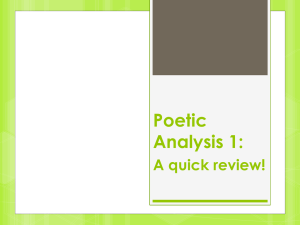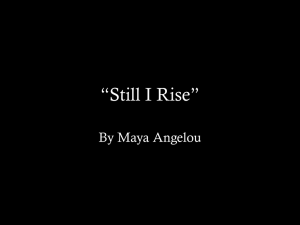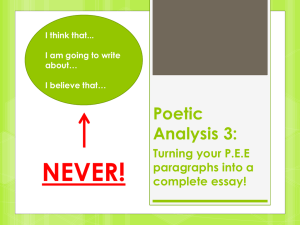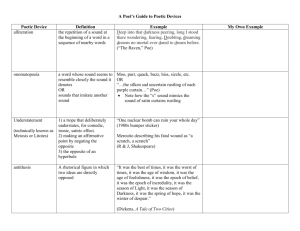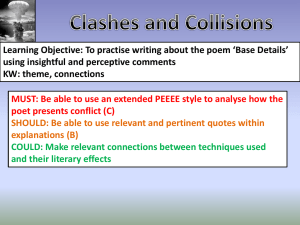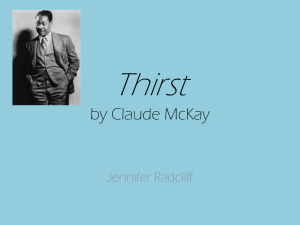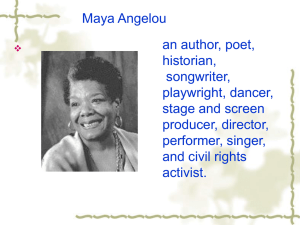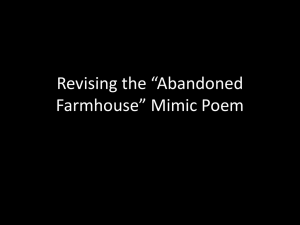Poetic Analysis 1: Expository Writing
advertisement
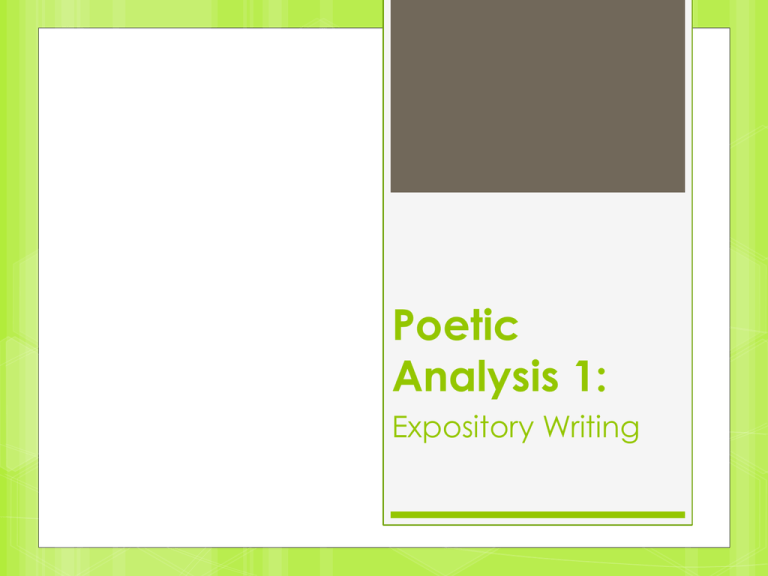
Poetic Analysis 1: Expository Writing What Is Poetic Analysis? Poetic analysis is a detailed discussion of how the language of a poem contributes to its meaning. How do I analysis poetry? Poetic analysis can be done by following three easy thinking steps and three easy writing steps! Poetic Analysis: Three easy thinking steps Read the poem. A lot! 1. 1. The more you read (and the more carefully you read), the better! Decide what you think the poem is about. 2. 1. If you have no idea, paraphrase the poem by line or stanza to help you figure it out. Identify the poetic devices you see in the poem. 3. 1. Why are they being used? How do they bring out the message of the poem? Once you figure out what the poem means and why devices are used, all you have to do is… P.E.E !! O I N T V I D E N C E X P L A N A T I O N Poetic Analysis: Three easy writing steps P.E.E. stands for: Point Evidence Explanation Let’s look at them one at a time… Step 1- Point The first sentence you write should be your topic sentence. This topic sentence tells your reader what that paragraph will be about. Step 2- Evidence After your topic sentence (point), you must give evidence from the text to support your point. Step 3- Explanation The final part of your paragraph is your explanation. Your explanation explains how your evidence relates to or illustrates your point. This is what YOU think! What YOU understand of the poem! Let’s do an example together: First, follow the thinking steps 1. Thinking Steps: Read (x3!) Still I Rise By Maya Angelou You may write me down in history With your bitter, twisted lies, You may trod me in the very dirt But still, like dust, I'll rise. Does my sassiness upset you? Why are you beset with gloom? 'Cause I walk like I've got oil wells Pumping in my living room. Just like moons and like suns, With the certainty of tides, Just like hopes springing high, Still I'll rise. Did you want to see me broken? Bowed head and lowered eyes? Shoulders falling down like teardrops. Weakened by my soulful cries. Does my haughtiness offend you? Don't you take it awful hard 'Cause I laugh like I've got gold mines Diggin' in my own back yard. You may shoot me with your words, You may cut me with your eyes, You may kill me with your hatefulness, But still, like air, I'll rise. Out of the huts of history's shame I rise Up from a past that's rooted in pain I rise I'm a black ocean, leaping and wide, Welling and swelling I bear in the tide. Leaving behind nights of terror and fear I rise Into a daybreak that's wondrously clear I rise Bringing the gifts that my ancestors gave, I am the dream and the hope of the slave. I rise I rise I rise. First, follow the thinking steps 1. 2. 3. Thinking Steps: Read (x3!) Decide what the poet is telling you Identify where, and why the poet uses poetic devices to show their meaning. Poets message: No matter what you try and do to her to keep her down, she is strong and will rise up no matter what. Still I Rise By Maya Angelou You may write me down in history With your bitter, twisted lies, You may trod me in the very dirt You may shoot me with your words, You may cut me with your eyes, But still, like dust, I'll rise. You may kill me with your hatefulness, But still, like air, I'll rise. Does my sassiness upset you? Repetition Out of the huts of history's shame I rise Up from a past that's rooted in pain I rise I'm a black ocean, leaping and wide, Welling and swelling I bear in the tide. Scheme Simile Symbolism Imagery Hyperbole Metaphor Why are you beset with gloom? 'Cause I walk like I've got oil wells Pumping in my living room. Just like moons and like suns, With the certainty of tides, Just like hopes springing high, Still I'll rise. Leaving behind nights of terror and fear Did you want to see me broken? I rise Bowed head and lowered eyes? Into a daybreak that's wondrously clear I rise Shoulders falling down like teardrops. Bringing the gifts that my ancestors gave, Weakened by my soulful cries. I am the dream and the hope of the slave. Does my haughtiness offend you? I rise I rise Don't you take it awful hard I rise. 'Cause I laugh like I've got gold mines Diggin' in my own back yard. Rhyme Rhyme Which one makes the most sense to me? Still I Rise By Maya Angelou – Similes You may write me down in history With your bitter, twisted lies, You may trod me in the very dirt But still, like dust, I'll rise. Does my sassiness upset you? Why are you beset with gloom? 'Cause I walk like I've got oil wells Pumping in my living room. Just like moons and like suns, With the certainty of tides, Just like hopes springing high, Still I'll rise. Did you want to see me broken? Bowed head and lowered eyes? Shoulders falling down like teardrops. Weakened by my soulful cries. Does my haughtiness offend you? Don't you take it awful hard 'Cause I laugh like I've got gold mines Diggin' in my own back yard. You may shoot me with your words, You may cut me with your eyes, You may kill me with your hatefulness, But still, like air, I'll rise. Out of the huts of history's shame I rise Up from a past that's rooted in pain I rise I'm a black ocean, leaping and wide, Welling and swelling I bear in the tide. Leaving behind nights of terror and fear I rise Into a daybreak that's wondrously clear I rise Bringing the gifts that my ancestors gave, I am the dream and the hope of the slave. I rise I rise I rise. First, follow the thinking steps 1. 2. 3. Thinking Steps: Read (x3!) Decide what the poet is telling us Identify how and where the poet using poetic devices to show their meaning. Poets message: No matter what you try and do to her to keep her down, she is strong and will rise up no matter what. She uses similes to show us just how much she will persevere. Next, follow the writing steps Writing Steps: POINT EVIDENCE EXPLANATION In the poem, “Still I Rise,” Maya Angelou uses similes to show her reader that no matter what anyone tries to do to her, nothing will ever keep her down. For example, the simile in line 4, “But still, like dust, I’ll rise” shows how Ms. Angelou can be stamped upon but will still rise up. She also uses similes in lines 7 and 8“’Cause I walk like I’ve got oil wells / Pumping in my living room” and 19 and 20 when she says, “’Cause I laugh like I’ve got gold mines / Diggin’ in my own backyard” to show how people may see her one way, but she knows she’s still happy with her life. By using such strong similes, Ms. Angelou shows just how strong and resilient she actually is. Just as wealth springs for those who own gold and oil, Ms. Angelou shows her inner spirit makes her just as rich. Finally, the humor and sense of joy that Ms. Angelou uses in her writing elicits the same feelings of humor and joy in her readers. It is as if anyone could be motivated to have the same sense of strength she does! Questions? Your turn! At your tables, work either independently or with a buddy to analyze either “Still I Rise” by Maya Angelou or “The Great Figure” by William Carlos Williams. Don’t forget the steps of both thinking and writing! 1. 2. 3. Thinking Steps: Read (x3!) Decide what the poet is telling you Identify how and where the poet uses poetic devices to show their meaning. 1. Writing Steps: Point 1. 2. Evidence 1. 3. Topic Sentence Quotes to support your point Explanation 1. What it all means to you
